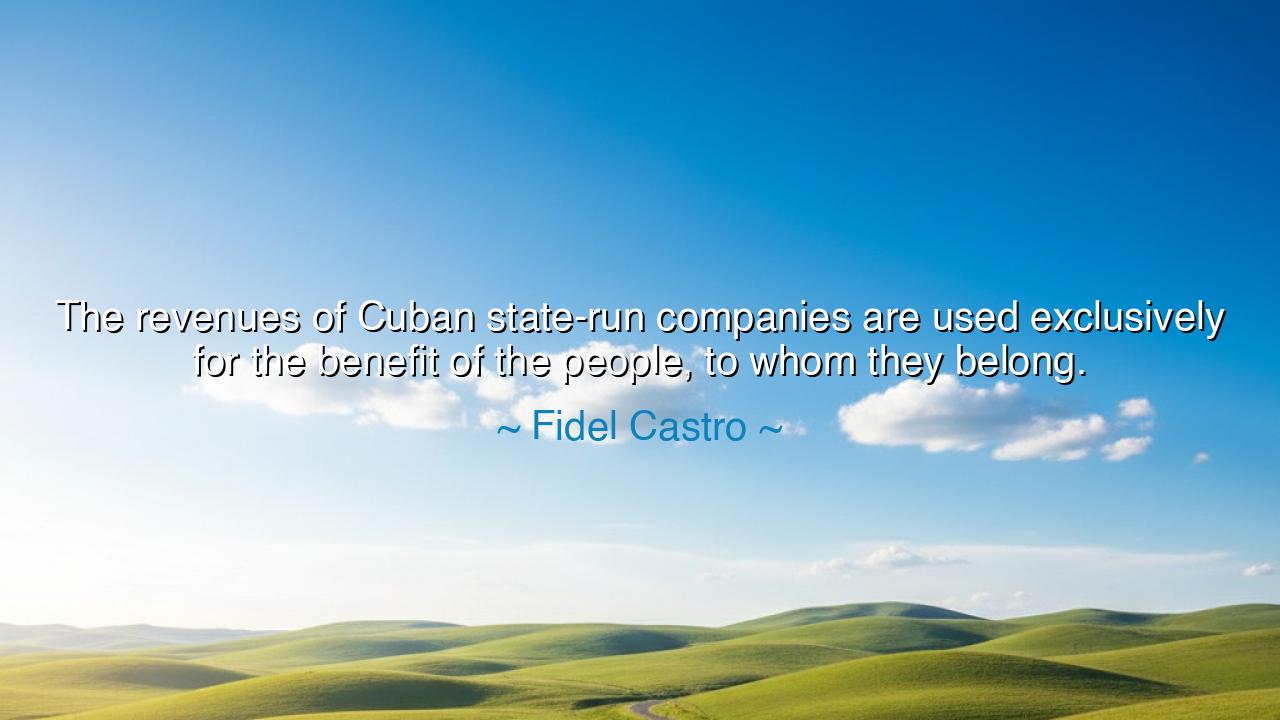
The revenues of Cuban state-run companies are used exclusively
The revenues of Cuban state-run companies are used exclusively for the benefit of the people, to whom they belong.






The words of Fidel Castro, fiery revolutionary and architect of a new Cuba, resound with the language of promise: “The revenues of Cuban state-run companies are used exclusively for the benefit of the people, to whom they belong.” In this declaration, he casts aside the creed of private profit and proclaims a vision of collective ownership, where the fruits of labor and industry flow not into the pockets of the few but into the hands of the many. It is a creed both noble and perilous, for it binds the wealth of a nation to the destiny of its people.
The ancients, too, wrestled with this question of ownership and common good. In the laws of Solon of Athens, debts were forgiven and land redistributed to preserve balance among the citizens, for he saw that when wealth served only the elite, society collapsed into strife. Castro’s words echo this same ideal: that the revenues of the state are not for kings or oligarchs, but for the people themselves, whose labor sustains the nation.
His saying was born from the crucible of revolution. After toppling the Batista regime in 1959, Castro vowed to end foreign domination and the vast inequality that had left the Cuban people in poverty. State-run companies, from sugar to oil, were seized and nationalized. Their revenues, he declared, would not enrich foreigners or elites, but build schools, hospitals, and social programs. To the oppressed, these words were a hymn of justice; to his enemies, they were a threat to property and power.
History shows both the promise and the peril of this vision. In the early years of the revolution, literacy campaigns swept the island, and health care reached the poorest villages, proving the power of collective revenues used for the common good. Yet in time, economic isolation, mismanagement, and corruption tested this ideal, revealing how difficult it is to turn revolutionary words into enduring prosperity. Castro’s statement remains as both a declaration of principle and a challenge to reality.
Let the generations remember: the question of who owns the wealth of a nation is no idle matter. It is the fire that has sparked revolutions, toppled empires, and reshaped societies. Castro’s words, forged in defiance of empire, remind us that the riches of the earth and the labor of the people must serve not the greed of the few, but the dignity of the many. Whether one embraces or rejects his vision, the truth remains eternal: a nation’s revenues must answer to its people, for it is they who bear its burdens and its hopes.






NNTrong Nghia Nguyen
The idea that the people own the revenue of state-run companies sounds like a strong foundation for equity and justice. However, it’s hard not to wonder whether the system can truly guarantee this benefit for everyone, or if the distribution of wealth ends up benefiting only certain sectors of the population. Is the concept of shared ownership truly reflected in practice, or is it a theoretical principle used to maintain political control?
TTTrang Thy
This quote makes me think about the relationship between government control and economic well-being. While it’s an ideal goal to have revenues benefit the people, how do we ensure that the system isn’t prone to misuse or mismanagement? Is there a level of trust that the government must build with its citizens for this system to work effectively? It brings up questions about accountability and transparency in state-run enterprises.
ADNguyen Ngoc Anh Duong
The idea that the revenues from state-run companies belong to the people is a compelling argument for socialism, but is it realistic? What happens when the system faces economic difficulties or inefficiencies? How are the people involved in decision-making, and do they have a say in how the funds are spent? It would be interesting to hear more about the practical application of this idea—whether it truly benefits the people in the long term.
LTLy Tran
This quote presents an appealing vision of a government that works for its people. But, can any government system really be this ideal? How can the people be certain that the revenues are being used wisely? I think it’s easy to say the money is for the people, but in many cases, the money might be spent on things that don’t directly benefit the population. It raises the question of how a government ensures transparency and fairness in this distribution.
XVXu Vu
I’m curious about how realistic this is in the long run. If the revenues from state-run companies are truly used exclusively for the people’s benefit, does that mean that no individual or group benefits unfairly? How does the government ensure that the wealth generated is distributed equitably? While the sentiment sounds good, how much accountability is there in practice to make sure the system doesn’t become corrupt or ineffective?